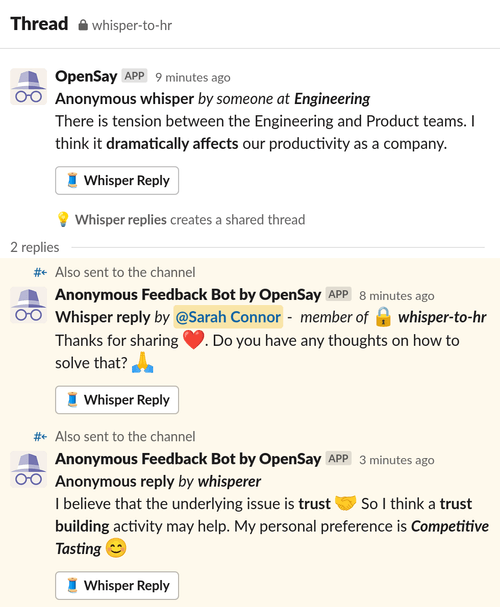Reimagining the Whistleblower Hotline: Why Whisper is Better
Foster trust, openness and comply with whistleblowing regulations

OpenSay
Jun 27, 2024
| �
2 min

Did you know that nearly half (46%) of employees fear retaliation if they report misconduct?1
It's time to change this narrative with a softer, more effective approach: whispering. In today’s corporate landscape, the term "whistleblower hotline" often conjures images of scandal and mistrust. This negative connotation can deter employees from reporting critical issues, fearing retaliation or stigma. It’s time to rethink how we approach anonymous reporting in the workplace. Enter the concept of the "whisper."
Whistleblowing: A Stigmatized Term
The word "whistleblowing" carries a heavy burden. It implies a loud, disruptive act, often associated with exposing wrongdoing in a sensational manner. This term can create a climate of fear and suspicion within a company, discouraging employees from speaking up about concerns. This is where the concept of 'whispering' comes in.
Whisper: A Softer Approach
In contrast, the term "whisper" suggests a more discreet and supportive means of communication. It implies a culture where employees feel safe and valued, encouraging them to share concerns without fear. A "whisper" feels like a private conversation, fostering trust and openness.
The Psychological Impact
Language shapes perception. When employees are encouraged to "whisper" rather than "blow the whistle," it can reduce anxiety and promote a more positive reporting culture. This subtle shift in terminology can lead to more employees coming forward with valuable feedback, ultimately benefiting the organization.
Practical Benefits
Adopting the term "whisper" can have tangible benefits:
- Increased Reporting: A softer term can encourage more employees to report issues.
- Improved Morale: Creating a safe space for feedback boosts overall employee morale.
- Proactive Problem-Solving: Early reporting allows companies to address issues before they escalate.
- Compliance with EU Whistleblowing Regulations: Using a whisper hotline helps organizations adhere to stringent EU regulations on whistleblowing, ensuring legal compliance and protection for whistleblowers.
Introducing OpenSay’s Slack Whisper Hotline
At OpenSay, we’ve embraced this concept with our Whisper Hotline. Our platform provides a secure, confidential and anonymous way for employees to share their concerns without the stigma associated with traditional whistleblowing.
Whispers are private messages, anonymous or not, that can be sent by any workspace member to a private channel ("whisper channel") where only specific persons are present, such as leadership or the HR team.
For example, here is a whisper being sent to the #whisper-to-hr private Slack channel:

A thread is shared between the whisperer and members of the whisper channel, allowing both parties to reply anonymously and form a communication channel. Both parties can voluntarily reveal their real identities while conversing.
With our Slack Whisper Channels, employees can easily report concerns directly in Slack, ensuring their anonymity and fostering a culture of transparency. OpenSay helps companies foster a culture of transparency and trust, ensuring that every voice is heard and valued.
Conclusion
Adopting a whisper approach can transform your organization's culture, promoting trust and compliance. Don’t wait—explore our Slack Whisper Hotline today and take the first step towards a more open and supportive workplace. See how our Slack Whisper Hotline can revolutionize your workplace. Schedule a demo now!